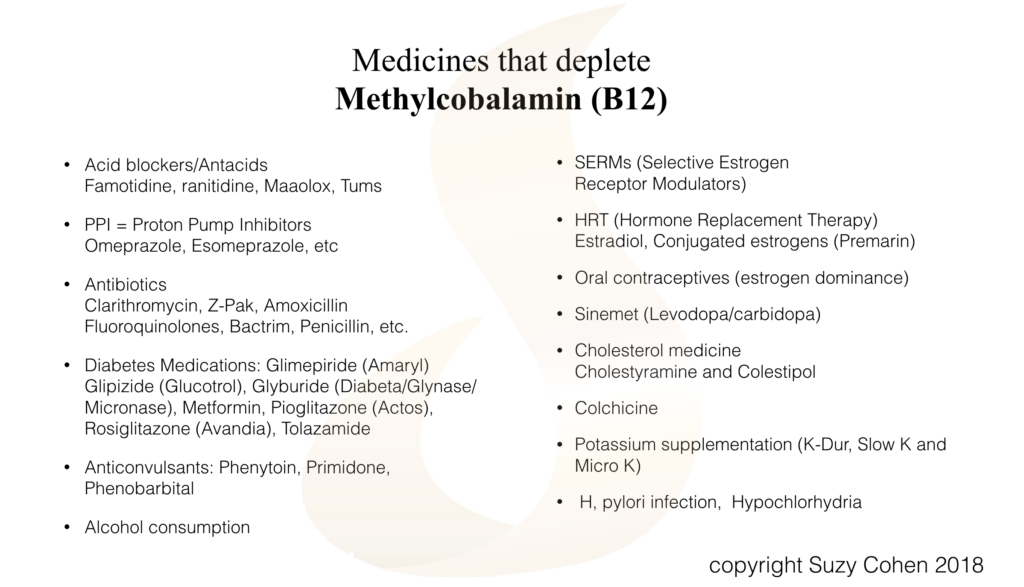What's On This Page?
ToggleDid you know that approximately 10-30 percent of adults suffer from some form of B complex vitamin deficiency? This often goes under the radar due to the subtle nature of symptoms or misattribution to aging. Sometimes a vitamin deficiency is misdiagnosed as a disease, and you are pinned with something you don’t have!
For example, I wonder how many people with depression are just deficient in folate. How many people with neuropathy are just deficient in pyridoxine, or not converting it to P5P which is the biologically active form?
But up to 30% of adults are B deficient???!!! That’s crazy. I think it may be that the B vitamins people supplement with are inferior forms, or that your body isn’t able to suck the B’s into your mitochondria where some of them do their best work! That’s the whole reason why I custom-formulated Mito B Complex – and also it is fully methylated to help with the methylation cycle and MTRR problems. If you didn’t realize this, the MTRR has something to do with high homocysteine. READ MORE.
It could be poor gut health preventing conversion and activation. It may be a missing cofactor. Whatever the cause is, the end result is the same. Low B-complex means poor health!
The root causes of such vitamin deficiencies can range from poor dietary choices to issues with nutrient absorption, as well as the drug mugging effect (ie drugs depleting nutrients). The problems a person deals with are often aggravated by aging-related changes in gut health, increased constipation, low thyroid hormone status, chronic stress, and/or a deficiency in probiotics. I should mention environmental status, lifestyle, and epigenetics play a role too.
Thyroid Hormone and B12
Let me elaborate a little bit on the thyroid connection. The most common B vitamin deficiency associated with hypothyroidism is a deficiency in Vitamin B12 which many people take in their B Complex vitamin, but sometimes they inject it I.M.
So the condition of hypothyroidism can lead to a reduced ability of your stomach to produce gastric acid, which is necessary for the absorption of Vitamin B12. Low levels of gastric acid can result in poor absorption of vitamin B12 from food, leading to deficiency. Vitamin B12 deficiency in hypothyroid persons can cause symptoms that overlap with hypothyroidism, such as fatigue, weakness, memory loss, and neurological changes. I think that’s what makes proper testing so important.
The Importance of B Complex Vitamins
B vitamins are pivotal in maintaining optimal health, playing vital roles in energy production, brain function, and cell metabolism. Their deficiency can lead to a host of health issues, some subtle and others more severe. As a healthcare professional, I’ve observed the transformative impact of these vitamins in my patients’ lives. But here’s Why You Should Think Twice Before Buying B Complex Vitamins.
Now, let’s delve deeper into each B vitamin and its specific benefits:
Thiamine (B1)
Essential for glucose metabolism, thiamine supports nerve, muscle, and heart function. A study published in the “Journal of Molecular Medicine” highlighted its critical role in preventing complications from diabetes. Benfotiamine, a synthetic derivative, offers enhanced bioavailability and think that’s one of several good chemical names to look for on your body.
Riboflavin (B2)
This vitamin is crucial for growth and energy production. According to research in the “American Journal of Clinical Nutrition,” riboflavin plays a significant role in reducing oxidative stress and may help in preventing migraines. The body-ready biologically active form of that is “riboflavin 5′ phosphate” in case you want to see if it’s in your brand. It definitely is in mine.
Niacin (B3)
Niacin aids in the functioning of the digestive system, skin, and nerves. Its role in lowering cholesterol and mitigating cardiovascular risks is well-documented in clinical studies. Look for “niacinamide” and/or “niacin” on your label. Keep in mind you might get a niacin heat flush, this is not dangerous and helps clear the body of cholesterol that’s why the drug makers use the flush form of niacin (because it works).
Pantothenic Acid (B5)
Vital for hormone and cholesterol synthesis, B5 also supports adrenal health. Research indicates its importance in wound healing and skin health. Look for D-calcium pantothenate.
Pyridoxine (B6)
Critical for brain development and function, B6 is involved in over 100 enzyme reactions. Its deficiency is linked to anemia and peripheral neuropathy, as per studies in many respectable peer-reviewed journals. Look for P5P which stands for pyridoxal 5 phosphate.
Biotin (B7)
Integral for lipid, protein, and carbohydrate metabolism, biotin also supports hair, skin, and nail health. Research in “Dermatology Practical & Conceptual” indicates its efficacy in treating brittle nail syndrome.
Folic Acid (B9)
I’ve written extensively on this B vitamin and the first thing I want you to know is that probably 95% of supplements have the inferior “folic acid” form of this nutrient. Your body can’t easily incorporate it, it is basically like taking a supplement that makes expensive urine! Worse, it competes on the receptor sites for natural folate!
You may be interested in my article, Folate Predicts Your Personality and Brain Power. Essential for cell creation and emotional health, folate or 5-MTHF (methyl tetrahydrofolate) forms are preferred for their bioavailability and because they are body-ready. Its role in preventing neural tube defects is well-established. Here is more information on FOLATE by the Linus Pauling Institute. Here’s How 15 Popular Medications Wipe Out Folate and Lead to Depression.
Cobalamin (B12)
Crucial for red blood cell production and nervous system maintenance, B12 is often lacking in vegetarian diets. Its deficiency can lead to anemia and neurological disturbances.
Deficiencies in these vitamins can manifest in various ways, such as fatigue, pale skin, and weakened immune systems. A deficiency in one B vitamin often means there is a deficiency in all the B vitamins because they are ‘complexed’ as a family. The risk of imbalance within the B vitamin family does exist, especially when high doses of one are taken in isolation. For instance, supplementing with just one B will tilt the others. Taking excess folate can mask a B12 deficiency, potentially leading to neurological problems and confusion.
To maintain a balance, B complex supplements that provide the full range of B vitamins are taken as opposed to just one B vitamin. These supplements ensure an adequate intake of all B vitamins in their most bioavailable forms.
In addition to supplementation, eating well is important. Vegetarians are often deficient in certain B’s especially B12.
Focus on Benfotiamine
Benfotiamine is a highly bioavailable form of this nutrient that is lab-made. A STUDY explored the effectiveness of Benfotiamine in treating Parkinson’s disease symptoms but it was done in rodents, not people. As you know, Parkinson’s disease is a neurological disorder that impairs movement and coordination. They gave the rats Parkinson’s by poisoning them with a chemical called MPTP (which stands for 1-methyl-4-phenyl-1,2,3,6-tetrahydropyridine).
This neurotoxin (which the rats breathed in) attacks areas of the brain and central nervous system and destroys all the dopamine-producing neurons. Then some of the animals were given vitamin B12 in the form of benfotiamine for 42 days. Those receiving benfotiamine had particular improvement in motor and non-motor symptoms.
Things like body balance, more “normal behavior” and increased levels of dopamine in the brain were noticed. The results of this study suggest that benfotiamine could act as an antioxidant and anti-inflammatory and help manage Parkinson’s disease symptoms. As good as it is though, it’s not a substitute for medication or proper medical intervention.
One last thing about thiamine… you usually see a mild deficiency in people who have a history of alcohol use or those who like to drink socially. Over time, the deficiency of B1 can become so severe that it causes Wernicke’s encephalopathy. Speaking of alcohol-induced B vitamin depletions, let’s talk about another B vitamin next. I’ll share a case study that is super interesting to me.

Focus on Pyridoxine
Pyridoxine (Vitamin B6) deficiency is a common condition in the United States, especially among individuals with alcohol use disorder or those who take prescription medications which are drug muggers of B6.
Pyridoxine deficiency causes some pretty nonspecific symptoms so it’s easy to miss. These can include peripheral neuropathy (nerve damage resulting in pain or numbness in extremities), stomatitis (inflammation of the mouth), dermatitis (skin irritations of any sort), brain fog or confusion, melancholy or depression, encephalopathy (brain disease but one that’s not really defined), and/or seizures. You can see how a misdiagnosis could easily occur if someone was simply deficient in B6.
The STUDY highlights patients with B6 deficiency had a history of alcohol use disorder. This is significant because alcohol metabolism in the liver leads to the breakdown of pyridoxal phosphate, a form of Vitamin B6. This breakdown results in pyridoxine deficiency. And the problem begins because your body needs B6 to make your main inhibitory neurotransmitter (the one that makes you sleepy). So when production of GABA (gamma-aminobutyric acid) goes down, seizure threhold lowers making them more likely to occur, and a diagnosis for epilepsy to be given.
The study I’m sharing with you now presents a case of a 57-year-old man with chronic alcoholism and a history of seizures. Despite being on anti-epileptic medication, he experienced myoclonic jerks (sudden muscle spasms), tremors, anxiety, and neuropathy. Someone was intelligent enough to run a blood test and discovered that he had pyridoxine (vitamin B6) deficiency! Remarkably, after receiving B6, his symptoms fully resolved!

This story underscores the importance of considering B vitamin depletion if you have neurological symptoms, particularly if a history of alcohol use is present.
You may not realize this from my one simple story above, but a B6 deficiency can lead to some pretty severe neurological problems in a person, including a syndrome of mild encephalopathy and/or cognitive changes, or changes in mental status. But the good news is that if discovered, they can be effectively treated with B6.
I can summarize this easily because I think Bs are important to the human body. Here are 6 critical reasons to consider a B complex vitamin supplement:
1. Neurological Health: Vitamin B6 plays a vital role in the synthesis of neurotransmitters like serotonin, dopamine, and GABA, which are essential for brain health and functioning. Supplementing with B6 can help maintain healthy brain function and may aid in preventing or managing conditions like depression and anxiety.
2. Metabolic Function: B6 is crucial for metabolizing amino acids, carbohydrates, and fats, making it essential for energy production. It helps in the proper functioning of enzymes involved in metabolism, contributing to overall energy levels and bodily functions.
3. Immune System Support: This vitamin is important for the health of the immune system. It assists in the production of antibodies and helps maintain normal immune function, making it a key nutrient for fighting off infections and illnesses.
4. Heart Health: Vitamin B6 has been linked to heart health by helping to regulate levels of homocysteine, an amino acid associated with heart disease when present in high levels. By managing homocysteine levels, B6 can help reduce the risk of heart disease.
5. Hormonal Balance: It assists in regulating hormones within the body and can be particularly beneficial for women in managing symptoms associated with premenstrual syndrome (PMS) and menopause. If you’d like to test your hormones with a no-hassle, easy urine test you do at home, take a look at my DUTCH TEST.
6. Skin Health: B6 is involved in the production of collagen, a protein that is vital for skin health, elasticity, and appearance. It can help in preventing skin disorders and maintaining a healthy complexion.
These reasons highlight the diverse and crucial roles Vitamin B6 plays in maintaining overall health and well-being. As with any supplement, it’s important to consult with a healthcare professional before starting to ensure it’s appropriate for your specific health needs and conditions. If you’re looking for a high-quality B vitamin that penetrates the mitochondria, check out my Mito B Complex!

Suzy Cohen, has been a licensed pharmacist for over 30 years and believes the best approach to chronic illness is a combination of natural medicine and conventional. She founded her own dietary supplement company specializing in custom-formulas, some of which have patents. With a special focus on functional medicine, thyroid health and drug nutrient depletion, Suzy is the author of several related books including Thyroid Healthy, Drug Muggers, Diabetes Without Drugs, and a nationally syndicated column.

